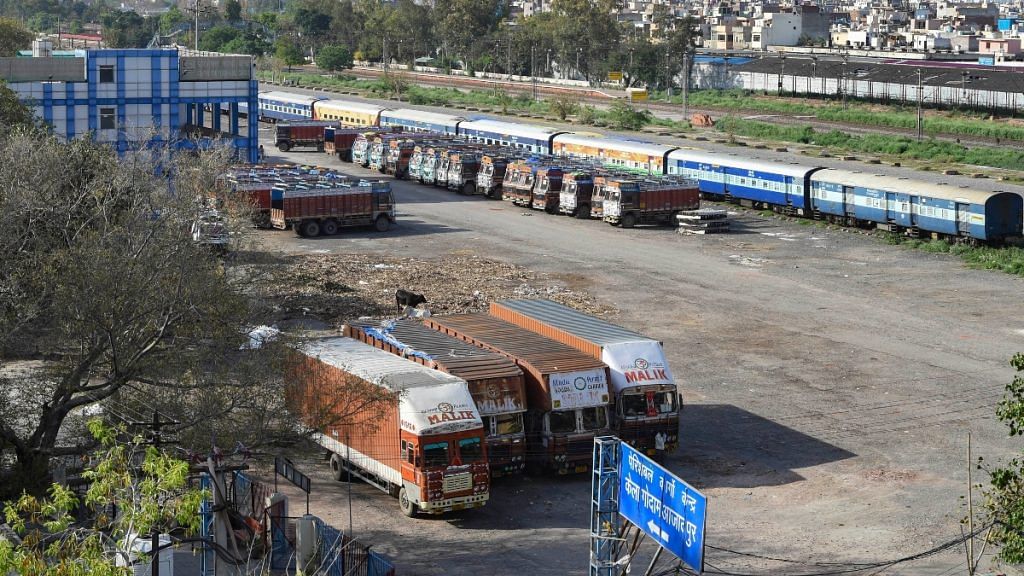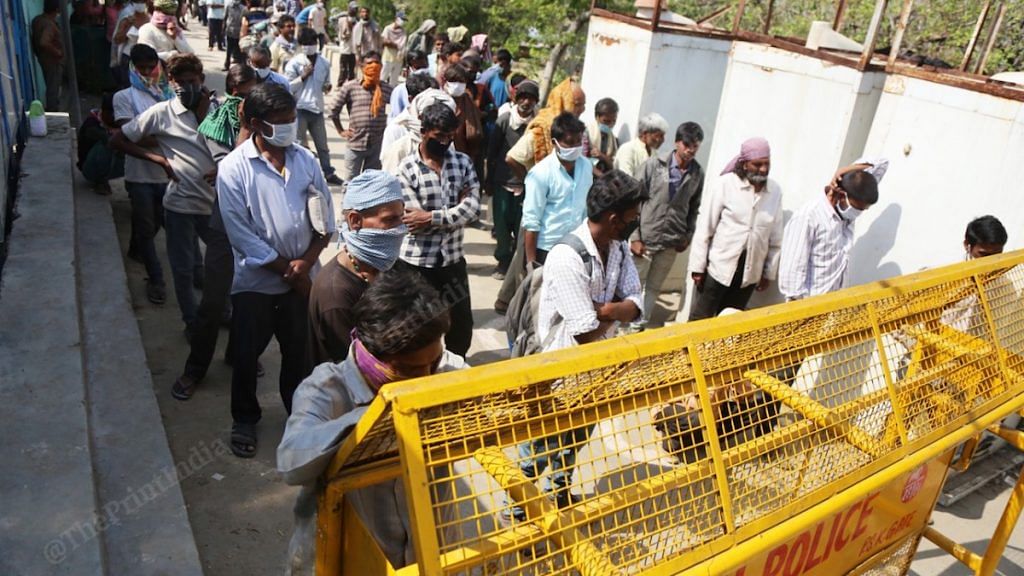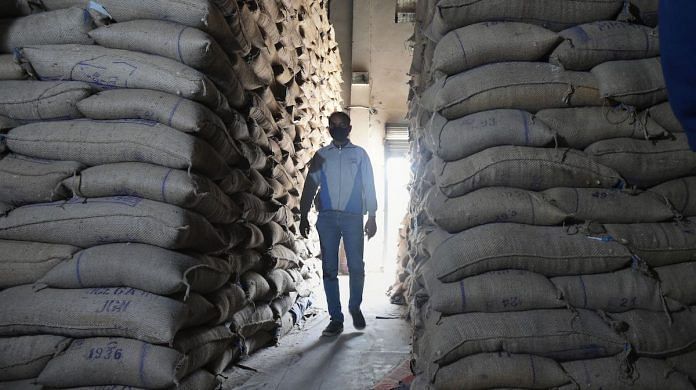In the early days of India’s coronavirus lockdown, a six-seater aircraft went from Delhi to Coimbatore with an unusual passenger on board. It was an inanimate object but a most important one—a hazmat (hazardous materials) suit that had been imported from Hong Kong and had to be replicated in Coimbatore. SpiceJet CEO Ajai Singh said he was proud to help, as the airline’s freighter aircraft were pressed into cargo duty.
If the Narendra Modi government’s national lockdown, to be now in place until 3 May, has created shortages and queues because of inadequate planning, it has also thrown up some supply chain heroes who have found solutions, big and small, to beat the shutdown.
From Amul, which managed almost seamlessly to continue pick-up twice a day from its 36 lakh dairy farmers across 18,700 village cooperatives and supply to its eventual users in 1,000 cities and towns, to the Ahmedabad Municipal Corporation, which within a night, got 10 e-rickshaws painted in vibrant colours and used it as a vehicle to supply vegetables in the city; from India Post, which used its iconic red vans to ferry medicines, PPE kits and financial services (such as pensions) within cities, to a coalition of 30 NGOs called Rural Community Response to Covid-19 (RCRC), which used its reach of six million and its cadre of 10,000 women from self-help groups to provide food to returning migrants, they kept the kitchens going and the hospitals functioning. As confusion prevailed over the definition of essential services and method of obtaining curfew passes, a few good men and women kept India’s supply chain oiled.
Also read: Amazon is hiring 75,000 more employees to keep up with coronavirus-induced consumer demand
The obstructions in the chain
Whether it was drafting the Indian Railways to transport more than 13 million tonne of foodgrain from the Food Corporation of India since the lockdown or getting Air India to launch its first cargo flight to bring back 19,416 kg of medical supplies from China, an empowered group headed by secretary of drinking water supply, Parameswaran Iyer, was on the lookout for ways to get essentials to those who needed them the most.
Added to that were individuals and corporates who were trying to fill the supply gap, whether it was using their factories to produce ventilators like industrialist Anand Mahindra, or film producer Manish Mundra who decided to supply 1,000 Personal Protective Equipment (PPE) kits to Mumbai hospitals every day — at a personal cost of Rs 48 lakh.
There were problems. Lack of people willing to come to work and those willing to come to work, facing harassment by police. Curfew passes were not given to more than 2-3 per cent of the total manpower.
So, at ports and airports, the consignees are not taking delivery of import cargo, clogging the supply chain, truckers are still facing issues on highways with no food or repair shops available, and many have gone away to their villages. Also, many are stranded with cargo because the premises where they were supposed to offload the cargo are closed, says Bhairavi Jani, MD, of logistics major SCA Group. “Staff strength is low but companies are taking individual initiatives to ensure safety of staff and encouraging them with financial and non-financial incentives,” she added.
Also read: Is talk of lifting lockdown premature or is it necessary to allow some economic activity?
Not an unusual circumstance
In some cases, even when working in emergencies was not unusual, such as for RS Sodhi, MD of Amul (Gujarat Cooperative Milk Marketing Federation), new protocols had to be followed: of washing hands and social distancing for the dairy farmers, of sanitising trucks for the drivers, and of sorting out the curfew passes especially for inter-state travel. Otherwise, says Sodhi, who’s been in Amul for 38 years, “We are used to working in curfews during riots and natural disasters, especially in Gujarat. Just the scale of it was nationwide this time.”
Scale was something the Ahmedabad Municipal Corporation dealt with as well. Municipal commissioner Vijay Nehra says they quickly ramped up the vegetable supply with 250 city auto-rickshaws, and took many other initiatives — including getting local restaurants to provide healthy meals twice a day free of cost to 6,000 people they had home quarantined and got city auto rickshaws to tie up with 36 grocery outlets to transport essentials.
But as Ved Arya, founder of Srijan, an NGO that works for sustainable livelihoods, and convener of RCRC, points out, the rural problems were somewhat different. The main problems of reverse migration were mobility and hunger. Several migrant workers were stuck midway and it took a lot of exchange of information between inter-state NGOs and governments to extricate them—from domestic workers leaving Delhi stuck in Uttar Pradesh on their way to Jharkhand, to returning migrants in Bihar escaping into the forests fearing police action and tough quarantine rules.

Also read: Companies in Covid-19: Beauty brands making sanitisers, biggest soap company giving free soap
Getting food on the tracks
The biggest challenge for India was and is foodgrain. The Railways will be delivering millions of tonnes of foodgrain to deficit states in April. This was critical because though the Food Corporation of India (FCI) has a staggering 77 million tonnes of foodgrain in stocks (as of March), it is dependent on the Railways for rakes to evacuate foodgrains from Punjab, Haryana as well as other procuring states (like Andhra Pradesh and Chhattisgarh). Former chairman and MD of FCI, Siraj Hussain says: “I do not think there is going to be any shortage of foodgrains for the Public Distribution System (PDS) now as all our districts, except very few, have storage capacity to keep three months’ stock. Outward movement of wheat and rice from Punjab and Haryana has substantially increased. Average loading from Punjab, for example, has increased from 15 railway rakes per day in most of February and March to about 25 rakes a day in April.”
The rabi crop will be harvested in Punjab and Haryana from 15 April and the state government has made good arrangements, he adds.
Now that the lockdown has been extended, the Modi government should give free rice to NGOs and they should provide free food in cities during this period, he says. “Urban poor are more distressed due to sudden lockdown because most of them may not be having ration cards in cities. They need to be fed during the lockdown. NGOs and some governments are doing it, but we expect more from the Centre for urban poor, because most of them are from the unorganised sector,” Hussain adds.
Indeed, whether it is Ruchira Gupta’s Apne Aap, which is feeding 5,000 people daily from the most marginalised community of sex workers and their families in Sonagachi, Kolkata (switching to dry rations for 2,500 families when the demand came in), or actor Shah Rukh Khan’s Meer Foundation, which has tied up with Pragya Kapoor’s Ek Saath — The Earth to provide daily food requirements to over 5,500 families for at least a month in Mumbai, collaboration between individuals, NGOs, states and between citizens and the government is the new normal.

Also read: Coronavirus pandemic is ominous news for India’s rabi crops and farm-to-food chain
After the lockdown
What of life after lockdown? Ved Arya believes many migrants will not want to leave their villages for fear of a largely urban disease recurring and anger at having been mistreated by their employers. Lack of manpower will prevent the supply industry from resuming at full throttle. But he sees an opportunity for rural entrepreneurship given the skills the migrants have learnt, whether it is polishing diamonds or embroidering high fashion garments. That is where he believes CSR funding and NGO support can help.
Bhairavi Jani’s advice to the Modi government post lockdown is to create a national e-pass system, many versions have been put across to the government already, to ease the operations and logistics. She says, take inputs from supply chain and logistics companies on a regular basis to keep the supply chain agile and logistics framework dynamic; and offer some financial relief to the sector.
For Ajai Singh of SpiceJet, who even had his passenger aircraft carry cargo on seats for the first time, the coronavirus may have hit the economy and especially the aviation sector badly, but there have been upsides too. “Indians have shown enormous discipline and positivity. At SpiceJet, we have been carrying 70 per cent of all air cargo in the last 15 days and even when we were asked to carry quarantined passengers from Iran from Delhi to Jodhpur, our staff took it upon itself to do their work with a sense of pride, with the belief that they were doing a national service,” he told ThePrint.
It’s a sentiment everyone shares.
The author is a senior journalist. Views are personal.




Every segment of society is cooperating except for Congress which is playing its dirty games in instigating workers.
It is funny to see article after article regretting the ‘unplanned’ lock down. Solely to avoid a fiasco as seen at Anand Vihar bus terminus, the government was forced to announce a lock down without prior notice. Else we would have seen mad scrambles in every part of the country and the purpose of the lock down would have been defeated.